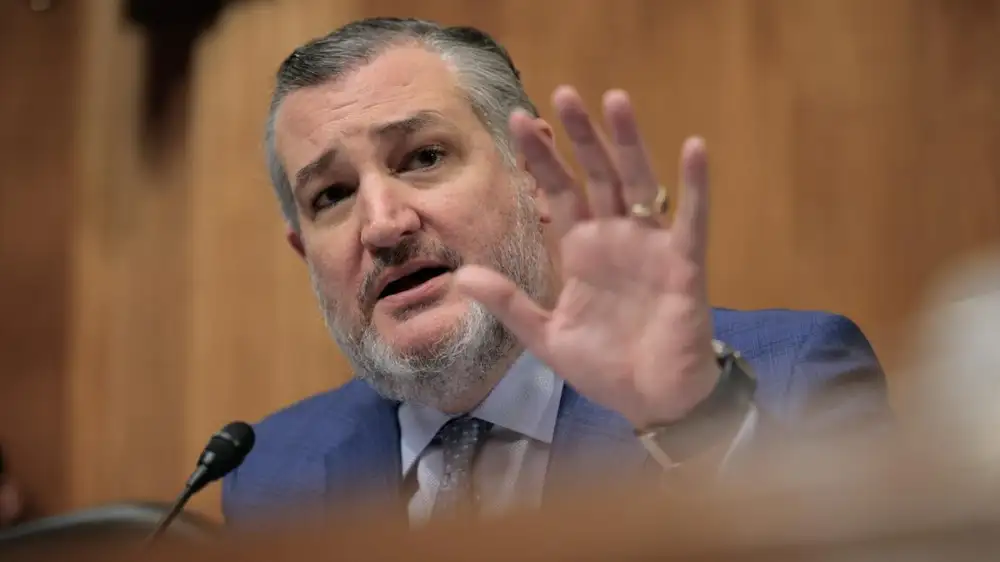Sen. Ted Cruz (R-Texas) wants to enforce a 10-year moratorium on AI regulation by making states ineligible for broadband funding if they try to impose any limits on development of artificial intelligence.
The House previously approved a budget bill that contained a fairly straightforward provision to ban state AI regulation for 10 years. Cruz, chairman of the Senate Commerce Committee, yesterday released budget reconciliation text that takes a different approach to preventing states from regulating AI.
Cruz's approach may be an attempt to get around the Senate's Byrd Rule, which limits the inclusion of "extraneous matter" in budget reconciliation legislation. He wants to make it impossible for states to receive money from the $42 billion Broadband Equity, Access, and Deployment (BEAD) program if they try to regulate AI. Cruz released a summary that says his bill "forbids states collecting BEAD money from strangling AI deployment with EU-style regulation."
The bill text provides an extra $500 million for the BEAD program, which was created to subsidize the construction of new or expanded broadband networks. Cruz's bill says that BEAD may be used for its original purpose of subsidizing broadband service and "to construct and deploy infrastructure for the provision of... artificial intelligence models, artificial intelligence systems, or automated decision systems."
The bill goes on to say that receipt of BEAD funds is conditioned on compliance with a 10-year moratorium on AI regulation. No money would be given to any state or territory that enforces "any law or regulation... limiting, restricting, or otherwise regulating artificial intelligence models, artificial intelligence systems, or automated decision systems entered into interstate commerce."
Consumer advocacy group Public Citizen said that Cruz's "attempt to tie broadband funding to AI deregulation is undemocratic and cruel."
"Under the committee's proposal, states would be barred from enforcing their own AI protections as a condition of receiving broadband funds meant to expand Internet access to underserved communities," the group said. Public Citizen advocate J.B. Branch said that "with this move, Republicans are telling millions of Americans: 'You can have broadband but only if your state gives up the right to protect you from AI abuses.'"
BEAD changes: No fiber preference, no low-cost mandate
The BEAD program is separately undergoing an overhaul because Republicans don't like how it was administered by Democrats. The Biden administration spent about three years developing rules and procedures for BEAD and then evaluating plans submitted by each US state and territory, but the Trump administration has delayed grants while it rewrites the rules.
While Biden's Commerce Department decided to prioritize the building of fiber networks, Republicans have pushed for a "tech-neutral approach" that would benefit cable companies, fixed wireless providers, and Elon Musk's Starlink satellite service.
Secretary of Commerce Howard Lutnick previewed changes in March, and today he announced more details of the overhaul that will eliminate the fiber preference and various requirements imposed on states. One notable but unsurprising change is that the Trump administration won't let states require grant recipients to offer low-cost Internet plans at specific rates to people with low incomes.
The National Telecommunications and Information Administration (NTIA) "will refuse to accept any low-cost service option proposed in a [state or territory's] Final Proposal that attempts to impose a specific rate level (i.e., dollar amount)," the Trump administration said. Instead, ISPs receiving subsidies will be able to continue offering "their existing, market driven low-cost plans to meet the statutory low-cost requirement."
The Benton Institute for Broadband & Society criticized the overhaul, saying that the Trump administration is investing in the cheapest broadband infrastructure instead of the best. "Fiber-based broadband networks will last longer, provide better, more reliable service, and scale to meet communities' ever-growing connectivity needs," the advocacy group said. "NTIA's new guidance is shortsighted and will undermine economic development in rural America for decades to come."
The Trump administration's overhaul drew praise from cable lobby group NCTA-The Internet & Television Association, whose members will find it easier to obtain subsidies. "We welcome changes to the BEAD program that will make the program more efficient and eliminate onerous requirements, which add unnecessary costs that impede broadband deployment efforts," NCTA said. "These updates are welcome improvements that will make it easier for providers to build faster, especially in hard-to-reach communities, without being bogged down by red tape."

 “Non-toxic masculinity”: Robert De Niro calls up Martin Scorsese for viral “goodnight bro” TikTok prank
“Non-toxic masculinity”: Robert De Niro calls up Martin Scorsese for viral “goodnight bro” TikTok prank